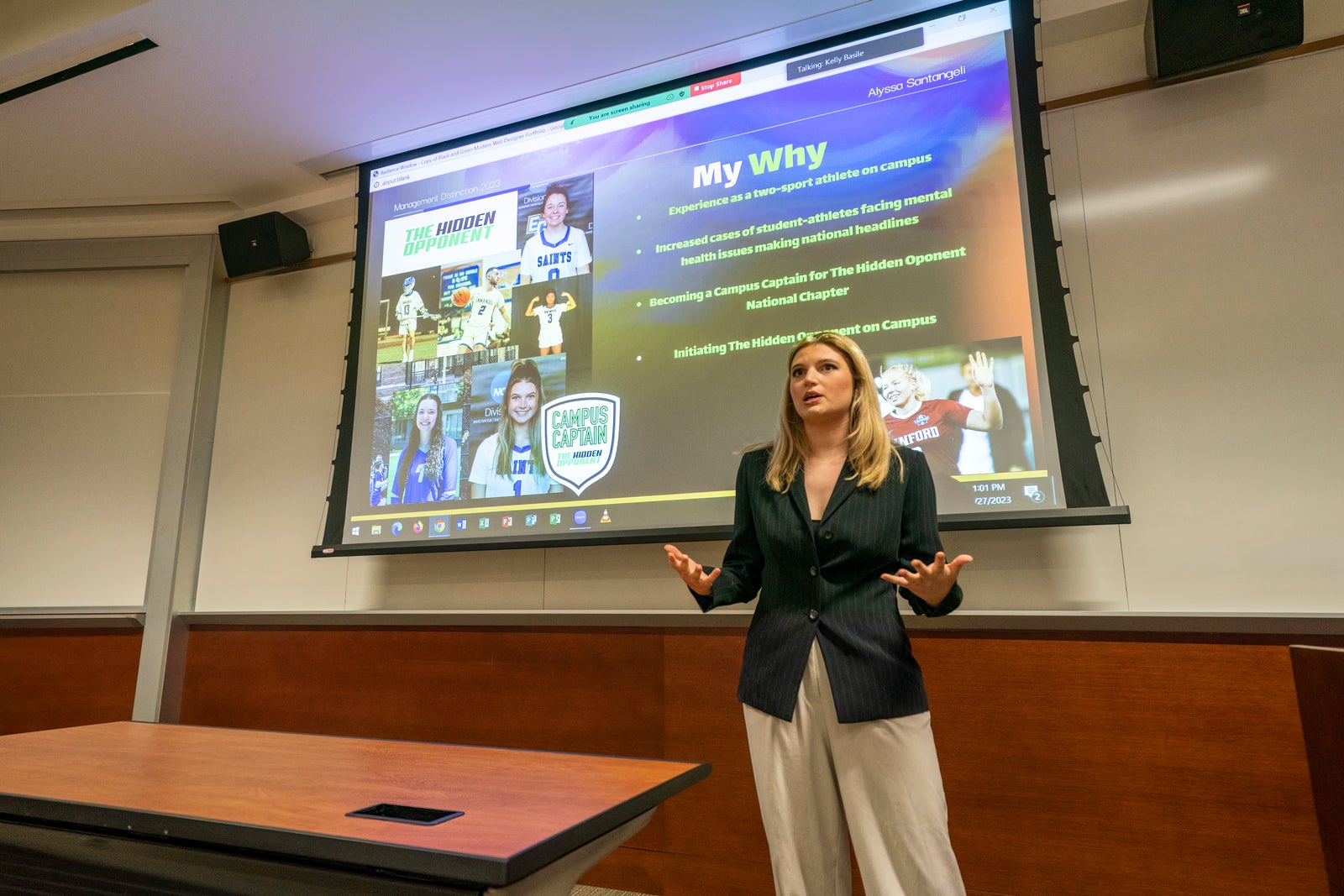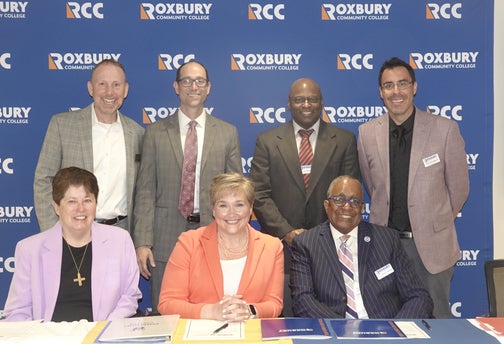Gain Expertise for Today’s Business World
At Emmanuel College, you’ll prepare for the future of accounting with a curriculum that incorporates advanced technologies, data analysis, and visualization tools alongside a strong foundation in financial accounting, managerial accounting, taxation, auditing, and assurance. Your studies will expand into economics, organizational behavior, operations, and business analytics—building your expertise across the business landscape.
Located in Boston, Emmanuel connects you to internships and professional networks across industries, preparing you with the technical knowledge, ethical foundation, and professional skills needed to excel in accounting and financial leadership roles.
Outcomes & Outlook
100%
100%
100%
$103K
A Best-In-Class Experience
Get to know the people and programs that will define your academic journey.

Kaci O’Grady ’25 Sets Her Sights on the CPA
From discovering accounting at Emmanuel to landing a post-grad role at EY, Kaci’s ready to launch her career.

Meet the Faculty
Our distinguished faculty publish, exhibit and research. Present, compose and chair. Inspire and collaborate.
The Curriculum
View the 2024-2025 Academic Catalog to find course titles, numbers and descriptions.
Requirements for a B.S. in Accounting
- ACCT1201 Financial Accounting (QA) (QR)
- ACCT2201 Managerial Accounting
- ACCT2203 Intermediate Accounting I
- ACCT2204 Intermediate Accounting II
- ACCT3203 Auditing and Assurance Services
- ACCT3206 Cost Accounting
- ACCT3296 Accounting Internship
- ACCT3411 Federal Income Taxes
- ACCT3413 Accounting Information Systems
- ACCT4201 Advanced Accounting
- ECON1101 Principles of Microeconomics (SA) (SS)
- MATH1118 Introduction to Statistics with R(QA) (QR)
- MATH1111 Calculus I (QA)(QR) OR MATH1121 Applied Mathematics for Management (QA) (QR)*
- MGMT1101 Introduction to Business
- MGMT2301 Legal Environment of Business
- MGMT2307 Organizational Behavior (SA) (SS) (DM) (WI)
- MGMT3210 Business Analytics
- MGMT3302 Operations Management
- MGMT3305 Financial Management
- *Students with a strong math background may take MATH1111 Calculus I or MATH1112 Calculus II
View the 2024-2025 Academic Catalog to find course titles, numbers and descriptions.
Requirements for Minor in Accounting:
- 1. ACCT1201 Financial Accounting (QA) (QR)
- 2. ACCT2201 Managerial Accounting
- 3. ACCT2203 Intermediate Accounting I
- 4. ACCT2204 Intermediate Accounting II
- 5.-6. Choose two from the following courses:
ACCT3205 Governmental and Non-Profit Account
ACCT3206 Cost Accounting - ACCT3411 Federal Income Tax
- ACCT3413 Accounting Information Systems
At the completion of the Accounting Major, students will:
- Demonstrate professional values and ethical behavior in accordance with various codes of professional conduct while considering a broad range of stakeholders.
- Evaluate internal and external contributors’ impact on performance, governance, reporting, sustainability, and compliance.
- Predict outcomes and capitalize on the diverse skills and backgrounds within a team to optimize innovative problem solving.
- Demonstrate effective written and oral communication and accept personal responsibility for soliciting and managing the receipt of feedback.
- Integrate developed competencies and skill sets, and design strategies for managing conflicts faced by professionals in an increasingly complex and interdisciplinary workplace.
- Collect, store, process and analyze information to be shared with various stakeholders through the preparation and presentation of external and internal reports in accordance with professional standards.
- Appraise the world's economic, social, cultural, and technological impact on accounting and business decision-making through the application of the liberal arts and sciences.
- Create opportunities to promote change, challenge assumptions, offer a different perspective, encourage experimentation, and strengthen positive thinking.
- Conduct research with professional skepticism, validate and analyze data for accuracy, uncover patterns and correlations, and provide visual context.
What can I do with a degree in accounting?
A major in accounting can open up a variety of career paths in the fields of finance, accounting, and business. Here are some common career paths for accounting majors:
- Certified Public Accountant (CPA): To become a CPA, you need to pass the Uniform CPA Exam and meet your state's specific education and experience requirements. CPAs can work in public accounting firms, corporations, government agencies, or even start their own firms.
- Financial Analyst: Financial analysts provide financial guidance to businesses and individuals by analyzing financial data and making recommendations for investments. They work in banks, insurance companies, and investment firms.
- Tax Accountant: Tax accountants help individuals and businesses prepare tax returns, provide tax planning advice, and keep up with changing tax laws. They work in public accounting firms, corporations, or as independent consultants.
- Auditor: Auditors review financial records to ensure accuracy and compliance with regulations. They work for accounting firms, government agencies, and corporations.
- Management Accountant: Management accountants provide financial information to company leaders to help them make decisions. They analyze financial data, create budgets, and provide financial reports. They work for corporations and government agencies.
Employers typically look for a combination of technical and soft skills in accountants. Here are some skills that are often sought after:
- Strong analytical skills: Accountants need to be able to analyze financial data and make recommendations based on their findings.
- Attention to detail: Accuracy is crucial in accounting, and employers look for candidates who have a strong eye for detail.
- Organizational skills: Accountants often have to juggle multiple tasks and deadlines, so employers look for candidates who can manage their time effectively and stay organized.
- Communication skills: Accountants often have to explain complex financial information to clients or colleagues, so strong communication skills are essential.
- Ethical standards: Accountants have access to sensitive financial information and must maintain high ethical standards in their work.
- Technical expertise: Employers look for candidates with a strong foundation in accounting principles and experience with accounting software and tools.
- Problem-solving skills: Accountants need to be able to identify and solve problems in financial data and provide solutions to clients or colleagues.
- Teamwork: Accountants often work in teams, so employers look for candidates who can collaborate effectively with others.
Where Essential Values and Skills Meet the Real World
Along with areas of knowledge and major requirements, you will cultivate essential values in the classroom and complete two courses in each area:
- Social Justice (SJ): Develop knowledge, skills, values and motivation to participate beneficially in activities of personal and public concern.
- Diversity & Multiculturalism (DM): Understand the complexity of identity the historical truths of different cultural perspectives to address bias and examine contemporary social issues.

One hundred percent of Emmanuel students complete an internship as part of the core curriculum. In a city as dynamic as Boston, your options are bound only by the limits of your curiosity.
Students from the School of Business & Management intern at all Big 4 accounting agencies, major financial institutions such as Morgan Stanley and Bank of America, and creative agencies and cultural organizations such as Hill Holliday and the Boston Symphony Orchestra.

In all majors, the Capstone Experience involves completing a significant piece of work that requires the integration and application of learning from multiple courses.
For students in the School of Business & Management, capstone courses blend theory and practice, with experiences ranging from live case consulting, research and analysis on current industry topics, the assessment of company performance and strategy and thesis presentations.

Related Programs
The Business Department also offers a major in Management with a concentration in Accounting
Business & Management Spotlight
See more stories and news related to the School of Business & Management


